Vitamin C Inside a Liposome Shows Prolonged Action
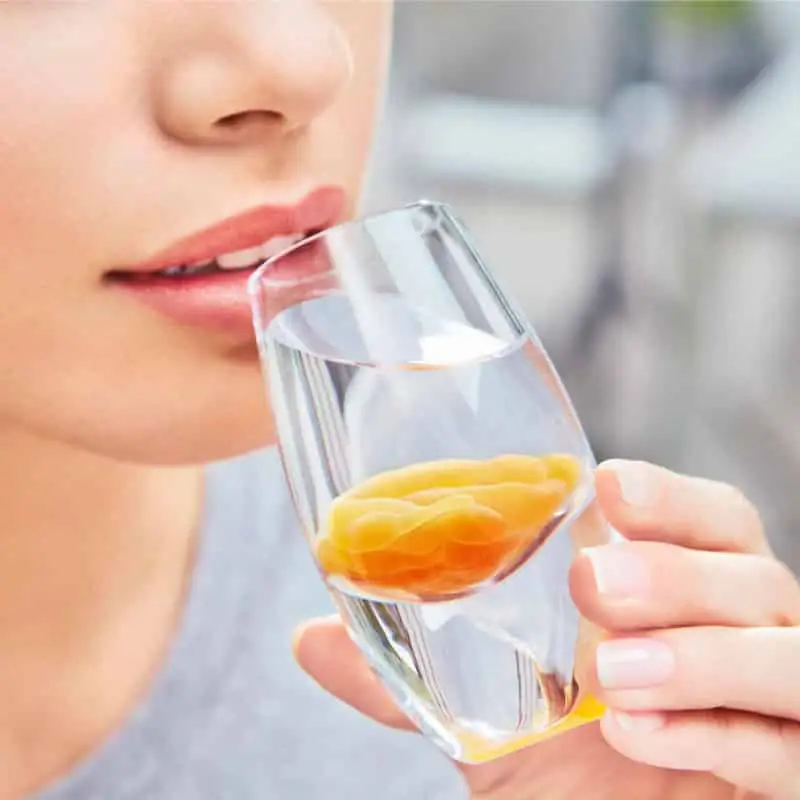
Manufacturers seek ways of improving the efficiency of already known supplements and liposomes are one of these ingenious inventions. What is liposomal vitamin C and why is it better than the traditional version? The short answer is it is the regular vitamin that is placed in a liposome: a very small protective container. The liposomal form offers such advantages as higher bioavailability and longer presence in the bloodstream. Here is why this happens.
Health Benefits
Vitamin C (also called ‘ascorbic acid’) is an essential vitamin that is required for various processes in the body, including collagen formation, tissue repair, production of neurotransmitters, iron absorption, and proper function of the immune system. What’s more, it is also an antioxidant that protects cells from the damage caused by free radicals.
Although most animals can synthesize their own ascorbic acid, humans (as well as apes and some monkeys and rodents) lack this ability and have to fully rely on dietary sources.
A total absence of the compound in a diet leads to scurvy, a disease a lot of mariners of the past suffered from. The first symptoms of scurvy are weakness and lethargy, which then worsen to gum disease, bone pain, poor wound healing and, eventually, death. Scurvy is treated — and prevented — by foods and dietary supplements that contain ascorbic acid.
One of the numerous detrimental effects of smoking is the depletion of vitamin C which almost immediately leads to dry and discolored skin. Passive smokers suffer from this condition as well.
The United States Academy of Sciences recommends that adult females receive at least 75 mg of ascorbic acid per day, and for adult males this figure reaches 90 mg/day. For smokers and people exposed to secondhand smoke additional 35 mg/day is required.
Food Sources
Although oranges and lemons got a lot of publicity as good ascorbic acid sources (they contain 53 mg of the compound per 100 grams), there are even better options such as blackcurrant (200 mg/100g), yellow and red bell peppers (183 and 128 mg/100g), broccoli and kiwifruit (90 mg/100g), redcurrant (80 mg/100g), strawberry and papaya (60 mg/100g).
Some common vegetables also contain measurable quantities of ascorbic acid, among them potato (20 mg/100g), tomato (14 mg/100g), and onion (7.4 mg/100g).
Animal-sourced foods are generally poor sources of vitamin C. Although such food as the raw chicken liver is relatively rich in ascorbic acid it still contains as much compound as potato; after the liver is fried this figure drops down by a factor of six.
The main drawbacks of food sources are:
- Need to regularly eat relatively large quantities of raw vegetables and fruit. An average adult male needs to eat at least 50 grams (2 ounces) of blackcurrant or 100 grams (4 ounces) of kiwifruit or 200 grams (8 ounces) of oranges per day — every day. Even people who truly like a fruit diet might get tired of it if they are not allowed a short break;
- Vitamin C is a water-soluble compound that leaks into the cooking water. What’s more, it decomposes very quickly if exposed to heat and metals. This means that boiled broccoli contains much less of it than raw one; you need to avoid cooking if you want your vitamin C intake to remain high.
Supplements, Side Effects, Bioavailability
There are numerous supplements on the market that offer a quick, affordable and effective way of getting the recommended daily intake of ascorbic acid. They come in numerous forms like tablets, powders, capsules, and ready-made drinks. A great advantage of such supplements is that ascorbic acid is difficult to overdose: it is water-soluble and any excesses of it in the blood are very rapidly excreted.
Side effects of ascorbic acid usually appear when it is taken on an empty stomach: a high dose of 2 000 mg (2 grams or more than 22 times as high as recommended daily intake for adult males) might cause such temporary symptoms as indigestion, nausea, and diarrhea. The use of supplements in the form of sodium ascorbate and calcium ascorbate reduces these side effects to a minimum: these compounds have less acidity than vitamin C itself and do not upset the stomach.
Bioavailability of the compound drops down quickly depending on the quantity you take: the greater the dose, the less share of it is absorbed by the body. For instance, if a small dose of 30 mg is taken, about 90% of it will be absorbed. On the other hand, if you take a large dose of 1 000 mg, less than 50% of it is absorbed.
Water-solubility of ascorbic acid can be seen as a disadvantage as well: its level in the blood starts to drop down about three hours after the intake. Thus, it doesn’t make much sense to take a single large dose of the compound: first, only part of it will be absorbed in the body, and second, it won’t last long in the bloodstream. Use of lower doses at regular intervals is much more preferable: bioavailability gets higher and once ascorbic acid in the blood is depleted you add more.
The main drawback of such a method is its inconvenience: you have to keep in mind (or use a computer app to remind you) that you have to take one more capsule at a certain hour. The liposomal version takes care of this inconvenience.
Benefits of Liposomal Vitamin C
The liposomal version of the compound is identical to the regular vitamin in all aspects except one. Standard supplements contain ascorbic acid and nothing else. Individual molecules of it find their way into the bloodstream through the digestive system and later they are excreted via urine.
In liposomal supplements each individual molecule is placed inside a liposome, a small lipid bubble that is close in its composition to the cell membranes of the body. Liposomes turn an overwise water-soluble compound into a fat-soluble; they deliver ascorbic acid directly to the cells so its bioavailability increases to more than 90% regardless of the dose.
What’s more, the level of the liposomal vitamin C in the blood does not drop down as quickly as it happens with the regular compound; in fact, liposomes hang in the blood until they find the cell they can give their load of ascorbic acid to.
Liposomal vitamin C has no side effects as the regular version. It causes no stomach upset and passes through the digestive tract unchanged until it reaches the bloodstream. Thus, it’s possible to take a large dose of the liposomal version of the compound and not fear indigestion.
Where to Buy Liposomal Vitamin C
iHerb is the world’s leading dietary supplements online store well-known for its affordable prices and numerous discount programs. Here are some of the supplements with liposomal ascorbic acid you can buy on iHerb:
Liposomal vitamin C from Dr. Mercola
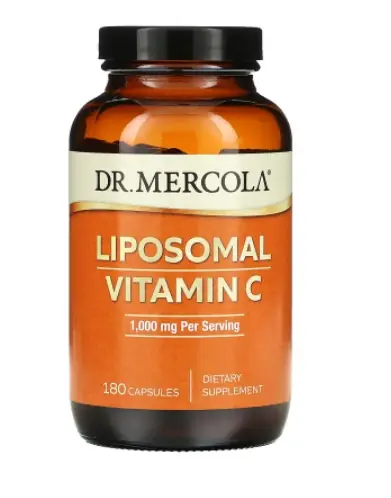
- High-quality product from a trusted brand
- Suitable for adults
- 500 mg/capsule
- Even though the manufacturer suggests using a higher dosage, one capsule with 500 mg per day will be enough for most adults, so this quantity of 180 capsules will last for a half a year of intake
Capsules for kids from Dr. Mercola
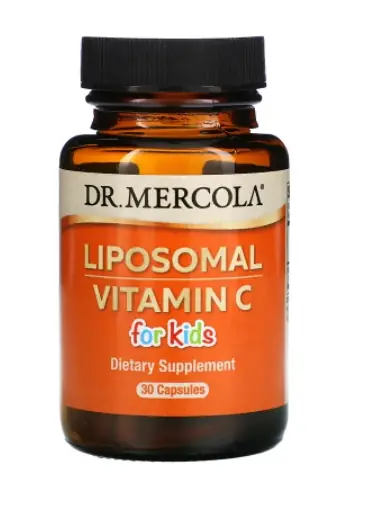
- High-quality supplement from a market leader
- Meant for children
- 125 mg/capsule
- Will be enough for a month
Liposomal vitamin C in a liquid form with a fruit flavor
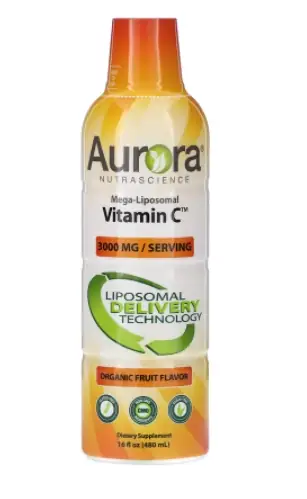
- Great taste
- 3000 mg/tablespoon
- 16 fl oz (480 ml)
- Does not contain sugar
- A great choice for those who are tired of capsules and tablets
Liposomal version from sunflowers
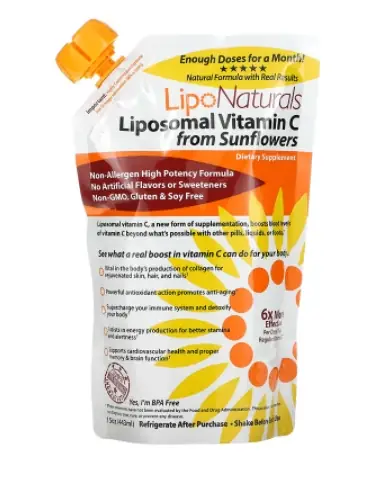
- 1000 mg/serving
- No artificial sweeteners and flavors
- Reliable brand ideal for vegans
- Non-Allergenic
It is sometimes recommended that the daily intake be increased when the first symptoms of a cold are being felt. Unfortunately, there are no studies that back this claim, although it is an established fact that ascorbic acid significantly reduces the frequency of colds in people under physical stress.
FAQ
- Is liposomal vitamin C better?
It is absolutely the same compound as regular ascorbic acid and has absolutely the same health benefits. What makes the liposomal version more preferable is that it a) has higher bioavailability, b) remains in the bloodstream for a considerably longer time. Thus, a single dose of the liposomal version equals several doses of the regular one taken during the day.
- Is liposomal vitamin C good for the skin?
Being an antioxidant, ascorbic acid protects cells from oxidative damage. What’s more, it is required for tissue regeneration. It is especially important for people who haven’t yet quit smoking.
- Can I use liposomal vitamin C for weight loss?
There are no reliable studies that establish a connection between ascorbic acid intake and weight loss. Regular physical exercises and a balanced diet will be a much better way to lose extra pounds. Still, ascorbates are important for your general health, so you might take them as well.
- Can liposomal vitamin C be used for better potency?
There is no direct correlation between ascorbate intake and sexual potency. As for the indirect one, the healthier you feel, the better your potency is, and ascorbates are known to promote general health.What is liposomal vitamin C and why it is so important for your health — now you know the answers to these questions. Take care!